Join us for Una Europa’s Cultural Heritage TRT3 (Heritage and Social Capital, Mutuality & Volunteering) Workshop, taking place online on 14 March 2025, from 10:00–13:00 (CET).
Zoom link / ID: 981 8268 1618 / Passcode: 836232
We look forward to welcoming you and extend our thanks to those who will be contributing to the workshop: Bowen Chai, Erik de Maaker, Esther Mijers & Jonny Geber, Katarzyna Plebańczyk, Graham Skeate, and Carlos Burgos Tartera. With a variety of themes, disciplines, and research locales, these presentations will offer a range of insight into how social capital, mutuality, and volunteering intersect with the dynamic processes of heritage-making across diverse contexts.
The workshop will follow this structure:
- 10:00–10:15 | Introduction by TRT3 Researchers
- 10:15–10:30 | Presentation by Bowen Chai
- 10:30–10:45 | Presentation by Erik de Maaker
- 10:45–11:00 | Presentation by Esther Mijers & Jonny Geber
- 11:00–11:15 | Discussion
- 11:15–11:30 | Break
- 11:30–11:45 | Presentation by Katarzyna Plebańczyk
- 11:45–12:00 | Presentation by Graham Skeate
- 12:00–12:15 | Presentation by Carlos Burgos Tartera
- 12:15–12:45 | Discussion
- 12:45–13:00 | Closing Remarks
The workshop aims to foster an exchange of ideas, explore collaborations, and discuss practicalities such as seed funding within the TRT3 framework. Feel free to be open, expressive, and share the event with others as well.
We look forward to welcoming you to a productive session. Please find bios and abstracts of participants below.
///////////////////BIOS & ABSTRACTS///////////////////
Dynamic Processes of Heritage-Making at the Waterloo Battlefield
Bowen Chai, University of Edinburgh & KU Leuven
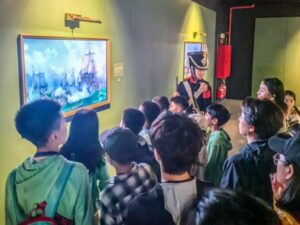
This research focuses on the Guides 1815 organization. It examines how voluntary participation in heritage preservation fosters both cultural transmission and the creation of social capital, particularly among retirees. The aim is to analyze the intersection of heritage preservation, community formation, and participatory engagement through guiding practices. The study employs ethnographic methods, including participant observation such as shadowing tours and in-depth interviews with guides, to investigate the everyday practices of Guides 1815. Archival research and analysis of museum records will also be incorporated to contextualize the role of the group in heritage-making. A focus will be placed on the group’s history, organizational structure, and the personal and social motivations behind volunteering. This research will highlight how the guides’ involvement in heritage-making creates a sense of purpose, community, and social connectedness, turning the preservation of history into a meaningful social activity. It will demonstrate the potential for heritage to function as a vehicle for social capital, illustrating how cultural engagement can foster collective bonds, emotional connections, and social networks within local communities.
Bowen Chai is a doctoral candidate in Social and Cultural Anthropology, currently enrolled in joint PhD programs at KU Leuven and the University of Edinburgh under the Una-Her-Doc framework. With a diverse professional background spanning multiple countries, he has worked with institutions such as the National Museum of China and Memorial Waterloo 1815 in Belgium. Trained at Queen’s University Belfast, Minzu University of China, the University of Oxford, and the University of Cambridge, Bowen’s research examines how heritage practices are shaped and negotiated at the intersection of authority, tourism, and agency.
///////////////////////////
Making Landscapes into Heritage: Framing, Values and Recognition
Erik de Maaker, University of Leiden
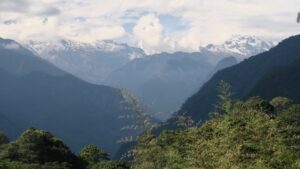
How can landscapes become cultural heritage? How do they obtain such a label, from who, and what is its impact on the people whose cultural values are invested with such a landscape? These are relevant questions since it is globally becoming increasingly common to recognize landscapes for their cultural significances. This kind of recognition necessarily involves claims to cultural ownership. That is, the significances attached to forests, lakes, rivers and mountain peaks is almost inevitably located with dedicated ethnic or religious communities. For example, the irrigated wet rice fields of Bali, declared UNESCO world Heritage in 2012, are the result of Hindu Balinese channeling spring water from divine sources. Likewise, mount Kanchenjunga in Sikkim (India), the third highest peak of the Himalayan range, received World Heritage recognition for the religious significances it holds to the local Lepcha community. Such landscapes have long histories of inhabitation, but what happens if these become recognized as ‘World Heritage’? In what respects are these adopted in an authorized heritage discourse, and with what consequence? In my presentation I will engage with these questions, arguing for the necessity to with various stakeholders research the opportunities such processes of heritage-making can entail, the consequences these can have, as well as the resistances these may give rise to.
Erik de Maaker is Associate Professor at the Institute of Cultural Anthropology and Development Sociology of Leiden University. His thematic focus is on the social constitution of values, objects and places, and their relevance in terms of ethnicity, indigeneity, heritage, environment and religion, mainly in upland South and Southeast Asia. He is currently leading a 5-year research project focusing on how appreciations of heritage can inform notions of sustainability in the eastern Himalayas. Orcid ID: 0000-0001-6371-1297
///////////////////////////
Belmont @ 80: Heritage and Memory of a Plantation in a Grenadian Community
Esther Mijers & Jonny Geber, University of Edinburgh
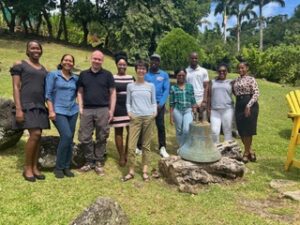
This project investigates the relationship between history, heritage, memory and identity, in collaboration with the Belmont Estate, Grenada. As an uninterrupted working estate since the late seventeenth century, it offers a unique perspective on Grenada’s history. Engaging local volunteers, we focus on the people of Belmont over its centuries-long history, and their heritage, to establish a local knowledge bank and resource centre for public use. As such, B@80 is a microstudy of the history and heritage of Grenada and other Windward Islands in the Caribbean. With the community, we co-created a methodology and developed training to record oral history, material culture and the historical landscape to make this available to the public. Ultimately B@80 seeks to develop a heritage framework from which stakeholders in Grenada can gather, develop and expand knowledge of the past and secure it for future generations. Aligning with SDG 16, this project plays an important role in the decolonising agenda and fosters a pathway to increased social justice and welfare. It aids Belmont to enhance its importance as a social enterprise in the community and benefits its members economically. Finally, it helps advance sustainable and equal heritage research in Grenada.
Esther Mijers: is a Senior Lecturer in Scottish History at the University of Edinburgh. She works on the history of early modern Scotland and its relations with the wider world, including Europe and the Americas. She has published on Scots in the Atlantic and is currently PI on the project ‘Belmont@80: Heritage and memory of a plantation in a Grenadian community’, which is a collaboration between History and Archaeology at Edinburgh and the Belmont estate, Grenada to record and digitise its history and heritage.
Jonny Geber is a bioarchaeologist and historical archaeologist, with a particular research focus on social marginality, poverty and the social archaeology of the subaltern.
///////////////////////////
Investing in the Capital of Individuals and Multiplying It
Katarzyna Plebańczyk, Jagiellonian University
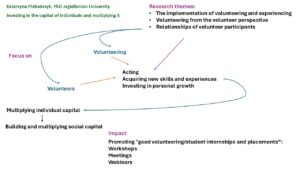
The active participation of citizens in public life stems from the heritage and experiences of previous generations. Investing in the capital of individuals and multiplying it for the common good and development, is a driving force for the economy, apart from having a direct impact on personal and social growth. Each individual involved in volunteering is not only acting for the common good but also acquiring new skills and experiences, investing in their own personal growth and multiplying it by supporting others, while also bringing an added value to the functioning of the organisations with which they are collaborating.
The above topic became the subject of the completed research project. The team members worked as volunteers in various initiatives in cultural field and collaborated with the organisations using volunteers. The research focused on main topics: the implementation of volunteering and experiencing volunteering from the volunteer perspective, relationships of volunteer participants. The results of the research project were adapted in the programme of the Małopolska Institute of Culture, the aim of which is to promote “good volunteering/student internships and placements”, among others by focusing on volunteers. The team’s attention is focused on volunteering organizers, such as cultural institutions or universities (student internships), but also on people who want to be volunteers. Meetings, webinars, etc. are held. The challenge is to reach and cooperate with those who influence the negative perception of this type of activity.
Katarzyna Plebańczyk – PhD in the discipline of Management Science, Institute of Culture, Faculty of Management and Social Communication, Jagiellonian University in Kraków (also serving as a student internship coordinator).
Research: CICERONE – Creative Industries Cultural Economy pROduction Network 2019-2023 (Horizon 2020); MC Member in COST Action 1007 Investigating Cultural Sustainability 2011-2015; the leader of the Polish team in the project “Local museums and European identities: heritage as a practice of belonging in Europe (MUSEUROPA)” under the UNA EUROPA Seed Funding SF2004. Member of the ISDRS – International Sustainable Development Research Society (including participation in the Mentorship Programme), the Institute for Research on Cultural Organizations, the Commission for Cultural Management of the Polish Academy of Arts and Sciences, and an advisory team of the National Observatory of Culture.
Research interests: public management, the implementation of sustainable development strategies in the cultural sector, the management of cultural organizations, including topics such as: managing relationships between organizations and stakeholders (especially audiences and volunteers), strategic management, audience development management, human resource management (including creativity and talent management), the role of individuals in management, particularly cultural managers, artistic managers, and artists.
///////////////////////////
Unresolved Aims; Reflections on Participation
Graham Skeate, KU Leuven & The University of Edinburgh
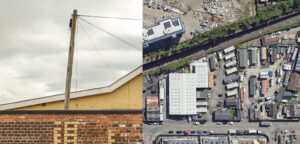
Many say heritage is a process—always becoming, never fixed. Yet participatory methods can lean towards determination, as if involving others inevitably draws us closer to understanding heritage and as experiential. But can this pursuit fall into the trap of perfecting the method rather than embracing the contingencies of the process itself?
What if participation focused less on the mechanics of incorporation and more on inhabiting the open-endedness of the process? Rather than treating participation as a means to an outcome—measured or neatly articulated—it could become a practice of attunement to the rhythms of ongoing change. This would privilege presence over precision, where the act of collectivising would allow for entanglements to unfold. This way, participation is not simply about who is involved or how, but how processes generate their own terms unpredictably, through negotiations, gatherings, tangents, refusals, and insights.
This aligns with slowform placemaking, where spaces are shaped by lived practices rather than fixed plans. Cultures around the world form their homes like this, often exemplifying how spaces emerge through adaptive responses to material conditions and social arrangements. Participation in this context means not only observing or intervening but learning to inhabit provisional grounds where open-ended decisions are layered through collective gestures, habits, and shared understandings. What if intentional forms of participation were to resist resolution, embracing the fertile disquiet of not knowing where a process might lead? And what if this could remind researchers that most subjects already have sophisticated methods of participation that might be the wiser shepherd for collaboration?
Graham Skeate is an Una-Her-Doc from the second cohort. He has a background in poetry, architectural conservation, and fine arts. His work is a collaboration with Glasgow’s Showpeople, focusing on the interplay of their social arrangements via the network of yards they have built throughout Glasgow.
/////////////////////
Transnational Heritage Governance in Mountain Regions
Carlos Burgos Tartera, University of Madrid & University of Bologna
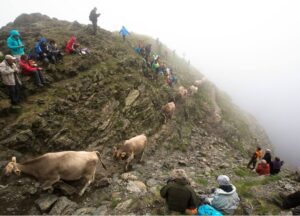
My aim and intended contributions to TRT3 focus on exploring governance structures in heritage management. I interpret governance structures as the formal and informal frameworks within a community that oversee its everyday affairs, shaping the relationships between administration, businesses, and residents. Emphasizing bottom-up approaches, I seek to highlight strategies that empower communities in safeguarding their heritage, fostering a strong sense of identity, place-making, and long-term sustainability. Ultimately, I view heritage as an active process—an asset that communities can leverage, capitalize on, and take pride in.
The main methodologies I am currently applying in my research are literature review and comparative analysis, but my intention is to go beyond the books and make interviews, focus groups and participatory fieldwork. My expected outcomes from this TRT is a deeper understanding of heritage as a social asset, learning from peers about its potential and risks. I do believe it can be a very enriching experience for everybody involved as it will foster debate and find new approaches.
Carlos Burgos Tartera is a student from the 3rd cohort of the UNA EUROPA PhD. With a Masters in Cultural Tourism and a publication in the Journal of Heritage Tourism, Participatory governance of intangible heritage to develop sustainable rural tourism. My research explores heritage-based solutions for remote communities, fostering intergenerational and cross-border dialogue to promote sustainable development and rural regeneration.
